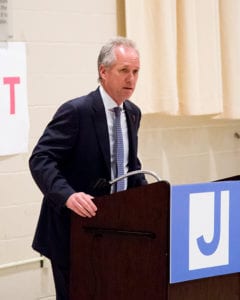By Lee Chottiner
Community Editor

Louisville Metro Mayor Greg Fischer joined a recent U.S. Conference of Mayors trip to Israel. The American Jewish Committee co-sponsored the trip. It was Fischer’s fourth visit to the Jewish state.
Greg Fischer’s recent trip to Israel was marred by a spate of terrorist attacks that almost came too close for comfort.
The three-term Louisville Metro mayor described one shooting that occurred “100 meters” (328 feet) from his hotel in Jaffa.
It was an incident that reminded him of the challenges that persistent violence poses to a community, be it a city or an entire country.
“Violence is the enemy of progress for both the Israelis and the Arabs,” Fischer said in an interview with Community.
As mayor, Fischer has had to contend with runaway gun violence here (181 homicides in 2021, according to Louisville Metro Police Department).
But Israel is different. When an attack occurs anywhere in the country, Fischer said, there is an “unrelenting focus” on national security and public safety that is not seen here.
“When a life is lost to terrorists [in Israel], the whole country is aware of it and wants to fight back on it,” Fischer said. “We have become so immune to it in this country. It is a different focus than what the Israelis have on state terror.”
Fischer was one of 12 mayors who were in Israel from March 26 to April 2 for a U.S. Conference of Mayors trip organized in partnership with the American Jewish Committee (AJC). Melanie Pell, AJC chief field officer in Louisville, was along for the trip.
While the mayors got a firsthand look at Israel’s muscular high tech and energy sectors (for instance, they learned about desalinization technology used to bring potable water to arid regions), Fischer said a leading purpose for the visit was public safety and how Israeli cities are prepared for it.
The group visited emergency control centers, which Fischer said were similar to those in the United States.
Pell said much of the trip was designed to show the security challenges faced by Israelis.
Describing a helicopter tour of the country that the mayors took, Pell said, “They see how narrow it is, how small it is.”
The mayors were also exposed to a Palestinian assessment of the situation. Though a visit to Ramallah in the West Bank was not deemed safe by either side, Dr. Khalil Shikakai, an associate professor of political science and director of the Palestinian Centre for Policy and Survey Research, met with the group.
What Fischer learned, from both sides, is that a frustrating stalemate exists, with no apparent way to break the cycle of violence.
“You see two peoples that are just traumatized and have been living with trauma for decades and centuries,” he said “They’re trying to find a way to live together, sometimes in a common space, oftentimes not common space, and with leadership that is not strong enough to get the job done right now.
The mayors also saw how Israeli cities use cameras and license plate readers to enhance security and reduce the “footprint” of police patrols, how they cope with rapid growth in densely populated areas and how new communities are literally being built “out of the sand there.”
“They have this notion that we can figure out anything,” he said.
Pell said the trips are intended to expose the mayors to as much as possible in a matter of days.
“There’s no substitute for firsthand on-the-ground experience,” she said. “I tell the groups if you don’t come home more confused, then we have failed you.”
The trip was Fischer’s fourth to Israel, having first visited the country in 1981 as a college graduate and self-described “22-year-old world traveler with a backpack.”
Since then, he has tracked the growth of a country he has come to know well.
“From 1981 to where it’s at today – a modern, creative society – is an incredible amount of progress in a relatively short amount of time,” he said.


